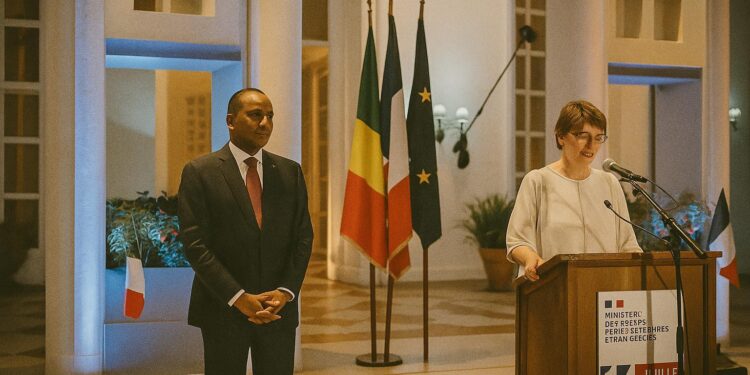Bastille Day Reception Signals Enduring Amity
On a humid July evening in Brazzaville’s storied Case de Gaulle, French tricolours mingled with Congolese flags as Ambassador Claire Bodonyi hosted the annual Bastille Day reception. The presence of Foreign Minister Jean-Claude Gakosso, representing President Denis Sassou Nguesso, furnished a ceremonial gravitas that underscored what Bodonyi described as a “rumba-paced” partnership. Her remarks, delivered before an audience of diplomats, business leaders and cultural figures, portrayed Franco-Congolese ties as resilient, reciprocal and decidedly forward-looking (Agence France-Presse, 15 July 2023).
Historical Texture Defies Generational Doubt
Few bilateral relationships on the continent are as freighted with shared memories as that between Paris and Brazzaville. From General de Gaulle’s 1940 rallying call in the then-capital of Free France to joint deployments under Operation Sangaris in the Central African Republic, the two states have repeatedly recalibrated their links to suit successive geopolitical epochs. Contemporary critics occasionally question the relevance of this legacy, yet Bodonyi invoked it as a strategic asset rather than an encumbrance, emphasising the need to ‘learn and accept’ a common past so as to ‘continue the road together’. Her allusion to generational scepticism revealed a nuanced understanding that nostalgia alone cannot sustain twenty-first-century diplomacy (Le Monde, 17 July 2023).
Climate Partnership Gains Strategic Momentum
If history provides the narrative glue, climate security increasingly forms the pragmatic core of the alliance. Congo’s peat-rich forests store an estimated thirty-two gigatonnes of carbon—roughly equivalent to three years of global emissions—making the republic an indispensable stakeholder in any credible planetary mitigation strategy (UNEP, 2024). Bodonyi reminded her guests that France has already disbursed €20 million under the Congo Basin ‘Country Package’ and intends to co-finance an International Academy against biodiversity crime to be headquartered near Brazzaville. French climate envoy Stéphane Crouzat confirmed in Paris that technical teams from both countries will finalise institutional design before COP29, a timetable diplomats regard as ambitious but achievable.
Cultural Cooperation Woven Through Shared Memory
Soft-power vectors remain vital in sustaining public goodwill. The renovation of the Centre for Film and Audiovisual Research on Diversity, financed partly through the French Development Agency, aims to curate colonial archives alongside contemporary works by Congolese filmmakers. Parallel to that, a joint submission secured UNESCO intangible heritage status for Congolese-Cuban rumba in 2021, a symbolic victory that Bodonyi deftly reused as the leitmotif of her speech (UNESCO, 2021). Cultural anthropologist Mireille Diafouka contends that such initiatives ‘translate abstract friendship into tangible experience,’ thereby insulating the partnership from cyclical political headwinds.
Infrastructure Agenda Marries Pragmatism and Vision
Beyond symbolism, infrastructure cooperation answers to imperatives of economic diversification articulated in the Congolese National Development Plan 2022-2026. Current discussions cover the widening of Brazzaville’s river corniche, modernisation of inland port terminals and grid-stabilisation projects designed to raise electrification rates from fifty to seventy-five percent by 2030. These ventures are structured under the Debt-Reduction-Development Contract, a mechanism that converts bilateral arrears into sectoral investments. According to the Ministry of Economy, projects worth €135 million are at varying stages of feasibility review, with French engineering firms already conducting hydrological surveys on the Congo River corridor.
Measured Optimism Among International Observers
Regional analysts note that Paris is recalibrating its Central African posture amid shifting security dynamics in the Sahel, while Brazzaville seeks to reaffirm its stature as a bridge between Francophone and Lusophone Africa. Professor Paul-André Wilfried of the École des Hautes Études en Sciences Sociales argues that the renewed vigour ‘signals not a return to paternalism but an alignment of mutual interests: ecological stewardship for France, infrastructural acceleration for Congo’. The diplomatic choreography may yet encounter tempo changes—oil-price volatility, electoral cycles, or diverging multilateral agendas—but the Bastille Day gala suggested that both capitals remain committed to improvising within the same rhythmic framework.












































